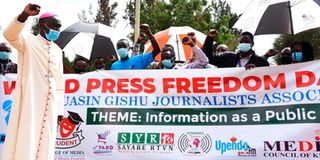How to make journalism love us back

Bishop Dominic Kimengich (left) of Eldoret Catholic Diocese at the Sacred Heart of Jesus Cathedral in Eldoret town, Uasin Gishu County during flagging off a procession of journalists marking the World Press Freedom Day on May 03, 2021.
What you need to know:
- On the global pandemic, we often forget that journalists too are victims of Covid-19.
- Many have contracted the disease and some even died of the virus.
This year’s World Press Freedom Day, usually observed on May 3, comes at a tough time when journalism is facing quintet of converging crises: a global pandemic, a struggling business model, disinformation, mental health crisis amongst journalists and declining safety and security of journalists.
These five crises have thrown Kenyan journalists into a season of unprecedented uncertainty and confusion even for veteran journalists who until a few months ago had claimed to have seen it all.
To put it bluntly in the words of a former colleague; “I love journalism but journalism does not love me back.”
This is true for many Kenyan journalists who put in hours of news gathering and risk their lives only to reap the bare minimum.
Journalists’ mental health
While a lot has been said in webinars and guest essays like this one, perhaps it is time for us to consider a few practical steps to address some of these issues.
On the global pandemic, we often forget that journalists too are victims of Covid-19. Many have contracted the disease and some even died of the virus.
According to Press Emblem, a Geneva-based organisation, 1,248 journalists across 75 countries have died due to Covid-19 complications since March 2020 till today. Five of those journalists are Kenyan, with Brazil recoding the highest at 187. Journalists need to be fully protected from Covid-19, whether it is through ensuring they are first in line for vaccination or even providing them with adequate health insurance for their peace of mind.
On mental health, it is time for those in Kenyan media leadership to declare journalists’ mental health an industry-wide crisis. It is a fact that we like to sweep under the rag, but Kenyan journalists need a lot of psychosocial support.
Journalists spend their days listening to people’s problems and covering horrific situations, but nobody asks if they are okay, let alone reach out to help. We need to destigmatize mental health in the newsrooms and provide journalists with safe outlets including free access to professional help.
Safety of journalists
Regarding the issue of safety and security of journalists, we must not only train journalists on media law, digital safety, sensitive reporting and secure communication through a structured system of continuous professional development, we must also do more to protect journalists who put their lives on the line for a story.
Safety of journalists goes beyond offline threats. Journalists must be protected from online bullying, smear campaigns and character assassinations on social media for simply doing their jobs.
Female journalists in particular, need to be protected at all costs. Surely, those who perpetrate such attacks must know that there are consequences for spreading lies against a journalist on Twitter or those swampy places on the internet.
We must move beyond lip service and bring honour to the journalism profession. Some of these problems could be solved through policy, but most them can be resolved by the stroke of a pen. It’s time for media leadership in this country to protect their greatest resource; journalists.
Dr Chege is the Director, Innovation Centre at Aga Khan University; [email protected]





